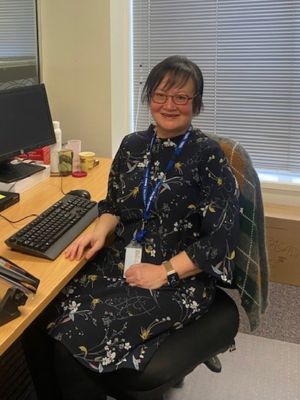
Clinic Scheduler May has worked with us for over two years.
I have EB (Epidermolysis Bullosa). It’s a rare genetic condition that makes my skin fragile and affects my mobility. When my daughter left home to study abroad, I found myself with free time, so I decided to rejoin the workforce. In the role as a clinic scheduler, I came to realise how satisfying it was to be able to contribute, to be productive and serve my community. I really like making a difference for other people.
An accessible workplace for me means having things like ramps and elevators for people who have trouble walking. For me, this also includes a combination of on-site and remote work, flexible work hours to attend medical appointments, conveniently allocated car parking to minimise walking and a workstation assessment and adjustments to support me in doing my job.
I have the lived experience of being a patient to understand what it's like for many of the people we look after.
There are a lot of people with hidden disabilities that aren’t immediately obvious – hearing, eyesight, blistering skin, people live with all sorts of things – you can’t assume we're all the same. When someone is visibly disabled people often make the wrong assumption that they also carry an intellectual disability, or that one's understanding is flawed. This myth needs busting!
I think the way in which May manages her condition speaks for itself, resilience, attention to detail, empathy and compassion are all attributes you want in your team.
During COVID-19 times, May was based at Starship which meant she was at risk due to vaccinations not being mandated for children. We found a role for her at Greenlane Clinical Centre where we could provide an appropriate office and more work-from-home options.
HR and occupational health have ensured we have done the right things by our patients as well as May to ensure we can all work safely together. Part of that involved having a workplace assessment done for May, to ensure that her desk and chair configuration and equipment were safe and optimal for her.
Explore the idea and the most suitable role as well as being flexible with physical and logistical issues to make it happen without deviating away from our main focus.
It’s important to talk about accessibility because it allows people with disabilities to actively participate in our workplace and communities, it gives diversity and demonstrates it can be done.
*Heather Carmichael, Business Support Manager, Child Health, Surgical Outpatients and Adult and Long Term Conditions for Patient Administration Services.
← Back to the news